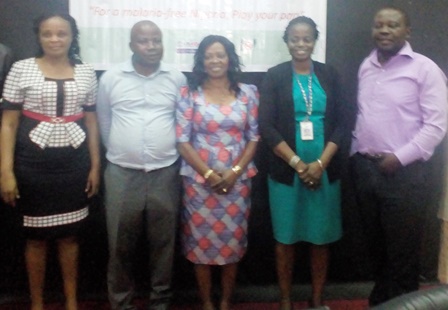Malaria in Pregnancy: Experts canvass early antenatal care as key to prevention

Pregnant women have been urged to cultivate the habit of reporting for antenatal care as soon as they miss their monthly period for proper checks for ailments such as malaria-related life-threatening disease.
Malaria, Nigeria’s most prevalent disease and a multiple-organ infection caused by a parasite called plasmodium which is transmitted by the female anopheles mosquito from one person to another has been proven to be dangerous to both mother and the foetus especially if not well treated.
Experts say almost all Nigerians, at least 97%, are at risk of getting malaria and it accounts for 11% of maternal deaths in pregnancy.
These facts were released to newsmen during a Media Chat on Malaria organized by the National Malaria Elimination Programme in collaboration with Health Writers Association of Nigeria (HEWAN) few days ago with the theme: ’Malaria in Pregnancy.’
In her presentation, Mrs. Itohowo Uko, Deputy Director & Head Advocacy, Communication Social Mobilization National Malaria Elimination Programme (NMEP) stressed that for pregnant women to prevent this deadly disease, women are expected to be using focused antenatal care during pregnancy; do Intermittent Preventive Treatment in Pregnancy (IPTp); use Long Lasting Insecticidal Nets (LLINs), and proper diagnosis and treatment as well.
She however explained that malaria can occur with or without symptoms in pregnancy which is why early focused antenatal care is necessary. She also listed other consequences of malaria in the mother and baby saying: “Malaria accounts for 11% of maternal deaths in pregnancy. It can cause anemia in the mother; it can lead to miscarriage.
“Malaria parasites can hide in the placenta and interfere with transfer of oxygen and nutrients to the baby. This increases the risk of: Miscarriage, still birth, pre-term birth, low birth weight -a great risk factor for death of new born in the first month of life,” she explained.
Throwing light on focused antenatal care, Mrs. Uko explained that every pregnant woman should attend four schedule visits to antenatal as follow: 1st visit: before 16 weeks, 2nd visit: 16 to <28 weeks, 3rd visit: 28 to < to 32 weeks and finally, 4th visit: 32 to 40 weeks
“These personalised visits provide the opportunity for a pregnant woman to be in contact with trained health care providers who can make regular malaria prevention and treatment interventions available to them,” Mrs. Uko said.
Also on Intermittent Preventive Treatment in pregnancy (IPTP) which is the use of Sulphadoxine-Pyremethamine tablets. She said Sulphadoxine-Pyrimethamine (SP) is a medicine of choice for Nigeria and for prevention of malaria in pregnancy and not for treatment of malaria. She said SP should be administered at regular intervals to prevent malaria during pregnancy and single dose of 3 tablets is given to pregnant women as follow:
“When pregnant women perceives movement of the baby; at monthly interval (4 weeks apart) up to delivery; women should receive at 3 or more doses during one pregnancy; administration should be by Directly Observed Therapy (DOT) ,” she said.
She however, noted that while there have been improvements in IPTp uptake from 2008 –2015, IPTp uptake is still relatively low, “if Nigeria wants to eliminate malaria and protect mothers and babies.” Mrs. Uko said, only 19% of pregnant women reported receiving at least 3 doses of SP as at 2015.
She wants pregnant women to continue to sleep under Long Lasting Insecticidal Nets (LLINs) despite all the myths and misconception towards it, emphasizing that it reduces human-vector contact by: Creating a physical barrier, repelling and killing the vector, mosquitoes and also reduces risk of malaria-related illness as well.
Lastly, explaining diagnosis and treatment of malaria in pregnancy she said: “When a pregnant woman has fever, she must go to the hospital to have a test done. Malaria can be confirmed by a positive Rapid Diagnostic Test kits for Malaria (mRDT) or by Microscopy test done by an expert laboratory scientist. Medicines to treat malaria must be in line with the National Treatment Guideline for Case Management at the nearest health facility. Pregnant women with symptomatic malaria are a high-risk group . Do not delay parasitological diagnosis and effective treatment at a health facility,” she further said.
Summarily Mrs. Uko advised, “Pregnant women should be prevented from getting malaria as it can quickly become severe if not promptly diagnosed and treated; prevention of malaria in pregnancy helps avoids the adverse consequences of malaria to both mother and fetus; Women need to report for ANC (as soon as they realize they are pregnant); All pregnant women should receive 3 or more doses of SP and all pregnant women must sleep inside LLINs, correctly and consistently, all night, all year round,” she emphatically stressed.
Dr Tolu Arowolo, from the World Health Organization (WHO) reiterated all the submissions by Mrs Uko, adding that not all fevers are malaria, which is why testing with Rapid Diagnostic Test (RDT) or microscopy to confirm malaria before treatment with Artemisinin-based Combination Therapy (ACT) is necessary.
She also pointed out that virtually everybody is at risk of malaria and the most vulnerable groups include: pregnant women, children Under 5 years of age, foreigners or people from non-endemic countries and people living with HIV/AIDS.
However, Dr. Arowolo wants the media to know that early detection and treatment of malaria reduces the severity of the disease and prevents deaths. It also contributes to reducing malaria transmission.


